 SDI Group is a leading British materials handling business specialising in retail apparel hanging and flat sortation. One of the major materials handling success stories of the last few years, to date SDI has installed over 300 sorters across the globe, sorting apparel for major retail customers including Asda George in Lymedale, Staffs, Hugo Boss in Germany, H&M in Belgium and Abercrombie & Fitch on both sides of the Atlantic, and Guess Jeans in Italy.
SDI Group is a leading British materials handling business specialising in retail apparel hanging and flat sortation. One of the major materials handling success stories of the last few years, to date SDI has installed over 300 sorters across the globe, sorting apparel for major retail customers including Asda George in Lymedale, Staffs, Hugo Boss in Germany, H&M in Belgium and Abercrombie & Fitch on both sides of the Atlantic, and Guess Jeans in Italy.
The SDI business was founded in the UK in 1996 by Gordon Smith, the current CEO, with support from SDI’s business in the US. Today SDI has manufacturing operations in Hinckley, Leicestershire, the heart of the UK garment distribution industry, workshops in Bielefeld Germany, and wholly owned offices and affiliates spanning the globe. It also employs over 60 software and controls engineers worldwide.
As both consultants and systems integrators, SDI Group Ltd is able to provide clients with a total logistics solution package which includes materials handling consulting, as well as design, engineering, fabrication, installation and integration services, which it provides to the retail, wholesale, fulfilment and e-commerce industries for all aspects of distribution centre materials handling. Building on its experience in this area SDI has recently developed a new flexible sortation unit, the FSU, with a capacity of up to 20,000 items per hour. Gordon Smith, CEO of SDI Group, spoke to Warehouse & Logistics News.
Warehouse & Logistics News – Gordon, We last spoke three years ago. How have things been since then?
It’s been a tough recession for us – we had to restructure, faced with a lower margin and volume business. It meant becoming more of a European operator, not dependent on any one country. Hence in the last few years we’ve become more global in our outlook and our operations, but we remain based in the UK. We became listed in 2007 on the AIM, the London Stock Exchange’s international market for smaller growing companies, and then bought the business back last year when we rejoined with our US operations. We now have a joint shareholding with them.
WLN – How does that work?
When we floated in 2007 we bought the two businesses, SDI UK and SDI US, together under the SDI Group banner. A year and a half in we sold the US operation back to its management in order to focus on the European market. They retained their shareholding in us to maintain SDI’s structure as a global group.
WLN – How would you sum up the SDI business now?
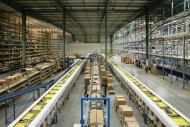 We still concentrate on retail apparel, most of it turnkey solutions for flat and hanging garment products. In 2008 we bought four companies from PEP, the German company, which further strengthened our offering. We offer world leading garment technology and a deep engineering capability, and can furnish a whole range of sortation systems and supporting services.
We still concentrate on retail apparel, most of it turnkey solutions for flat and hanging garment products. In 2008 we bought four companies from PEP, the German company, which further strengthened our offering. We offer world leading garment technology and a deep engineering capability, and can furnish a whole range of sortation systems and supporting services.
WLN – Besides garment sortation, which other areas are you experts in?
We have a deep understanding of retail logistics, across all general merchandise. We also cover sortation for books, CD’s and pharmaceuticals, but our principal market is still soft goods.
WLN – Do you sell to UK garment manufacturers, distributors and retailers direct?
Yes, we do, and also to third party logistics providers.
WLN – Which businesses did you buy from PEP? Are these now fully absorbed in the business?
PEP was a world leader in single unit handling, and we bought their complete trading operation. PEP as was is now closed out, and the business is fully absorbed into SDI.
WLN – What trends are you seeing in the business at the moment?
The continuing drive to even greater efficiency is increasing use of sortation, and growing demand for both hang and flat sortation. We’re also seeing increased use of sortation technology by clients such as Guess in Italy, Abercrombie and Fitch here and in the US, and Nike and others around the world in order to reduce distribution centre picking costs and improve stock availability at the store.
WLN – As CEO, what is your role in the company day to day? Do you go to see individual clients and help deliver solutions for them?
My role is about growing the business across Europe, but I’m also pretty hands on, and enjoy being involved in the retail business and its ever changing landscape.
WLN – How much of your time do you spend in the UK these days?
I spend about half my time outside the UK.
WLN – How important is the UK to your business? How has this changed over recent years?
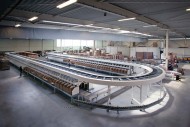 Britain is still our principal market, but as I mentioned earlier we’ve changed our strategy so now we’re not dependent on any one country. Our other major territories are France, Benelux, Germany, Spain, Italy and Poland.
Britain is still our principal market, but as I mentioned earlier we’ve changed our strategy so now we’re not dependent on any one country. Our other major territories are France, Benelux, Germany, Spain, Italy and Poland.
WLN – How big is SDI Group Ltd now, in global turnover and staff? Who is on the UK senior management team?
Our projected 2011 global turnover is £50m, and we have 500 staff, 100 in the UK. Our senior management team comprises me, Steve Butler, our CFO, who is ex DHL and strengthens our expertise in, and our links to, the logistics industry, Haden Smith, who heads up our European Operations, and our European Country Managers.
WLN – Can you talk us through the different kinds of standard and bespoke sortation systems in your range? What volume of throughputs do they handle?
Our flat range covers single unit, end-stage carton products, and has throughputs of 12-14,000 units an hour. The bulk of our sortation systems of this kind were tray sorters, but now we’re seeing more and more orders in this area for pick and pack and parcel sortation. In hanging sortation, our systems are designed for packaged garments, both single and multi-packs, and handle up to 15,000 units per hour.
WLN – What size and kind of operations are your systems aimed at?
Our typical customers are operations moving from manual materials handling to highly automated systems. Our focus is mainly on distribution centres, processing from 2 to 3 million units up to 80-100 million units annually
WLN – Can your systems read RF tags and bar codes?
Yes, they can read both. A key part of the development of our new flexible sortation unit, the FSU, is the ability to handle plastic trays, working ‘Scan on The Fly,’ and reading RF tags in line. By working with plastic trays instead of metal ones, the FSU can read RF tags, with much higher accuracy.
WLN – Can you tell us more about the FSU? How different is it to what’s gone before?
The FSU is a development on the established ‘Bomb Bay’ design. We’ve taken away the chain or belt drive, so goods can go up and down or in snake sections, hence the ‘flexible’ aspect, which is what customers told us they wanted. The FSU has modular motors, which are used on start up and then idle until power is needed again.
WLN – What kind of items can the FSU handle? How energy efficient is it?
The FSU is principally designed for use in apparel, but can also handle such items as books, accessories and CDs. Its ease of maintenance, flexibility and simplicity has meant it has been well received by the market.
WLN – You mentioned modular motors being used in the FSU. Have you changed the motors in your other systems?
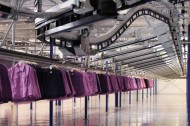 Yes, we have. Elsewhere in our range we use a lot more distributed motors in our systems now, instead of linear drives. It’s all about saving energy. We’ve also simplified our drives across our range to reduce the need for high cost replacement parts.
Yes, we have. Elsewhere in our range we use a lot more distributed motors in our systems now, instead of linear drives. It’s all about saving energy. We’ve also simplified our drives across our range to reduce the need for high cost replacement parts.
WLN – How important is energy efficiency in choosing sortation systems?
Energy saving is becoming a more and more important consideration in whole life energy use.
WLN – Do you also design conveyor systems and automated storage and retrieval systems?
We act as systems integrators and are happy to supply conveyors or ASRS as part of our solutions, but we don’t make them ourselves. We do provide all our own software integrated into these solutions.
WLN – What software solutions and controls do you supply?
We supply all our own software and controls, including warehouse controls and WMS systems. We develop all our software in house. Our control systems are modular and currently support over 300 of our sorters across the globe, many of them in use 24/7.
WLN – Whereabouts are your offices in Europe?
As well as our locations in Royston and Hinckley we have offices in the Netherlands, France, Germany, Italy, Spain and Poland, and affiliate partners in the US, Brazil, Chile, India, Australia and New Zealand.
WLN – Do you sell either your materials handling equipment or your controls to other integrators as part of their solutions?
We don’t at present, but we intend to in the future. The acquisition of PEP brought us in touch with various integrators, and we’re now looking at making our equipment and controls available to them.
WLN – Where do you design and develop your systems?
Most of our machinery is developed and built at Beilefeld in Germany, with fabrication and tweaking carried out in the UK and US.
WLN – What other warehouse services can you provide?
If required, we can support our sortation systems with the installation of efficient racking systems and mezzanine flooring. Our support philosophy also extends to offering additional warehouse necessities such as lighting, loading dock equipment, sprinklers, packing benches and many others.
WLN – Do you also carry out the building work, electricals and so on for your systems?
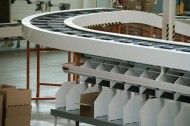 We can take on total project management responsibility, including civils and general fit out, and act as one point of contact. This work is often given to a building contractor, who won’t necessarily appreciate the finer points of the equipment they are creating a working environment for. Having us taking this on is a means of maximising the equipment’s effectiveness, and means everyone works together as one team.
We can take on total project management responsibility, including civils and general fit out, and act as one point of contact. This work is often given to a building contractor, who won’t necessarily appreciate the finer points of the equipment they are creating a working environment for. Having us taking this on is a means of maximising the equipment’s effectiveness, and means everyone works together as one team.
WLN – How long can one of your solutions take from going live to installation? How long does it take to see a return?
Our systems can take anything from three months to two years to put in place. You can expect to see an ROI in two to three years.
WLN – How do you coordinate work on major international projects?
Most of our international coordination is done from the UK. For major projects and smaller projects alike, we allocate locally based project managers from our local country operation. We’re recruiting all the time.
WLN – Can you tell us about the projects you’ve carried out for Asda George and Hugo Boss?
We’ve been working for Asda George for seven years, on their RDC at Stoke. We built the world distribution centre for Hugo Boss’s suit range in Germany, which used high speed sortation and a very innovative method of garment transport.
WLN – What work are you doing for Abercrombie & Fitch?
We are fitting out a DC in Holland, for Abercrombie & Fitch, run by TNT’s fashion operation, which serves the whole of Europe. We’re also working on a similar project for A&F in the US. Both feature the new FSU. The European one is due to be completed in November.
WLN – Do you have pilot sites you can show potential customers?
Yes, with our very extensive installed base we can generally show them examples of the way customers have dealt with common retail distribution supply chain issues, which helps enormously during solution design.
WLN – On the opposite page we have a case study for Decathlon in Italy. Why was that project significant?
The Decathlon project demonstrates our European capability as solutions providers, and highlights the world leading technology of the FSU and its ability to handle sportswear and produce a compelling payback for the customer.
WLN – Do you also carry out maintenance?
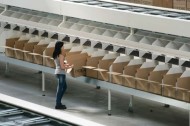 SDI Group provides a complete maintenance and support service that delivers a responsive and flexible solution for all material handling operations. We see maintenance and service of equipment and controls as an important part of our business, and provide it as a bespoke service within our overall operation.
SDI Group provides a complete maintenance and support service that delivers a responsive and flexible solution for all material handling operations. We see maintenance and service of equipment and controls as an important part of our business, and provide it as a bespoke service within our overall operation.
Working in partnership with our customers, we develop tailored packages that streamline their maintenance process to achieve minimum downtime, lower overheads and a reduced administrative burden. This approach ensures maximum up time for a customer’s order fulfilment system, and where breakdowns do occur provides instant reaction to breakdowns.
WLN – Who runs the service side? Can you service systems made by other companies as well as yours?
Haden Smith and Mike Ryan head up our maintenance and service side, and yes, we are very happy to be asked to service other people’s sorters, ASRS, conveyors, cranes and control systems.
WLN – What do your consultancy services cover?
Rather than simply selling equipment, our services cover the detailed process of designing and building a materials handling system based on the customer’s merchandising mix. We analyse their data, identify the ideal solution for them and then carry out simulations and assess the likely ROI. From there we carry out the design and build, and provide the full after sales service.
WLN – Can you refurbish existing sortation systems?
Any such equipment up to ten years old can probably be refurbished successfully.
WLN – What about refurbishing materials handling systems made by other manufacturers?
In the last three years people have asked us this question a lot, and the answer is, yes we can. Most kit of this kind is made from standard components, and we have a lot of experts here at SDI who can help keep systems running.
WLN – Are you exhibiting at any industry shows over the next few months?
We’re participating in the forthcoming Logistics Link shows and we’ll also be at Logimat in Germany.
WLN – What effect has the recent recession had on your business, if any?
 It’s been a turning point for us. We lost half our pipeline of work at the beginning, and had to rebuild and make our workforce more flexible. That made us then look at everything and become more flexible generally. We’ve rationalised our manufacturing and software development, so it’s not duplicated in different parts of the world. Critically, we now see ourselves as a European business, not reliant on a single country market.
It’s been a turning point for us. We lost half our pipeline of work at the beginning, and had to rebuild and make our workforce more flexible. That made us then look at everything and become more flexible generally. We’ve rationalised our manufacturing and software development, so it’s not duplicated in different parts of the world. Critically, we now see ourselves as a European business, not reliant on a single country market.
WLN – Finally, where do you see SDI Group going from here? Any plans for any more acquisitions?
In the short term, we’re currently looking at some major ventures in South America and possible partner companies to help us enhance our software capability in the fashion arena, as this is a major part of our expertise. It’s been a tough few years all round, but we’re still determined and importantly, keen, to grow and develop further. We’re proud of what we’ve achieved so far and want to continue satisfying our customers here and in other countries. It’s an exciting time to be in this business.
SDI Group
Tel: 01763 244 299




Comments are closed.